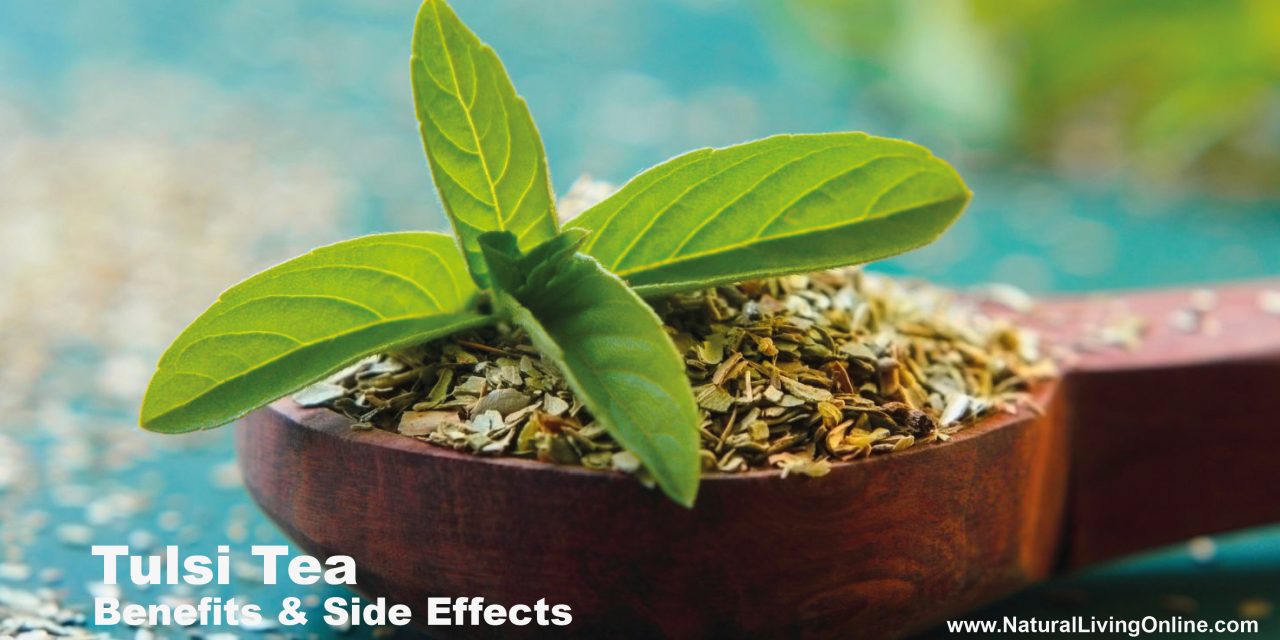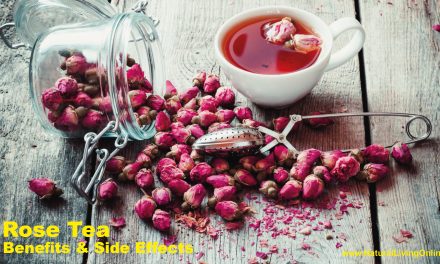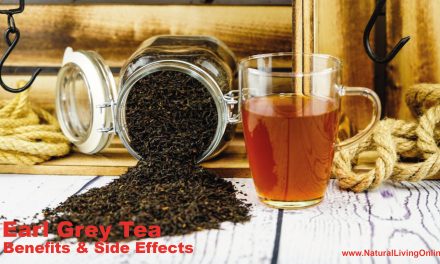Tulsi tea, also known as holy basil tea, has been used for centuries in Ayurvedic medicine. This aromatic herb offers a range of potential health benefits. Tulsi tea may help reduce stress, improve mood, and support overall well-being.
The tea is made from the leaves of the Ocimum sanctum plant, which is native to India. It has a pleasant, slightly sweet flavor with hints of mint and clove. Many people enjoy drinking tulsi tea as a caffeine-free alternative to regular tea or coffee.
Research suggests that tulsi tea might have anti-inflammatory and antioxidant properties. These qualities may help support the immune system and protect against various health issues. While more studies are needed, early results are promising for this ancient herbal remedy.
Key Takeaways
- Tulsi tea is an herbal beverage with potential stress-reducing and mood-boosting effects.
- The tea contains compounds that may offer anti-inflammatory and antioxidant benefits.
- Drinking tulsi tea could support overall health and well-being as part of a balanced lifestyle.
Historical and Cultural Significance
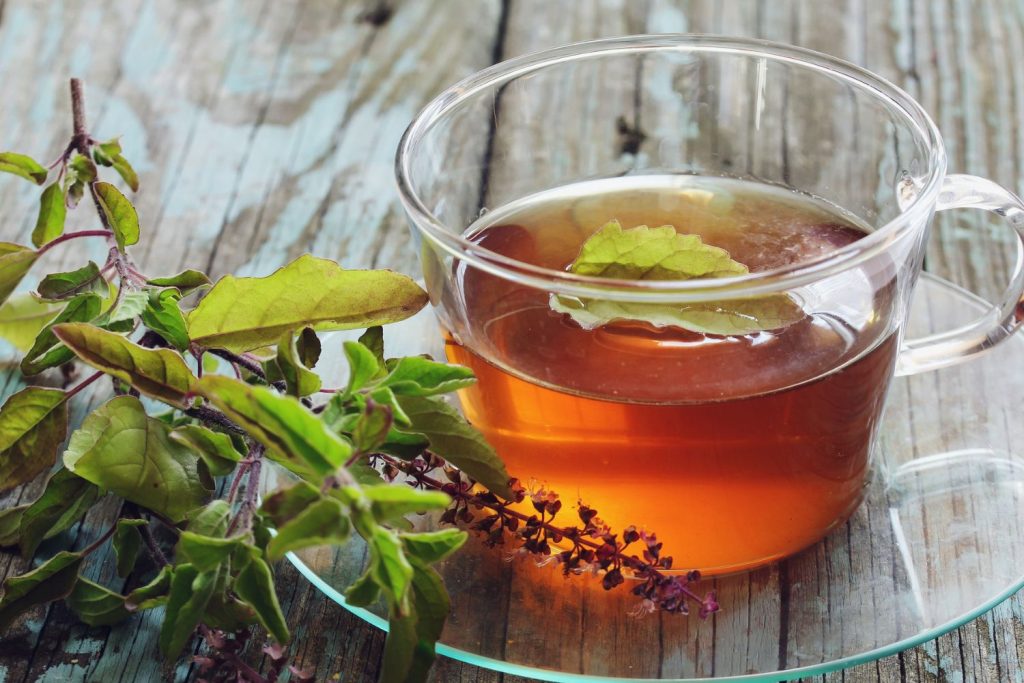
Tulsi tea holds deep roots in Indian tradition and Ayurvedic medicine. Its rich history spans thousands of years, intertwining spiritual beliefs with health practices.
Origin in Ayurveda
Tulsi, also known as holy basil, has been used in Ayurveda for over 3,000 years. This ancient Indian healing system views tulsi as a sacred plant with powerful medicinal properties.
In Ayurvedic texts, tulsi is described as an adaptogen. This means it helps the body adapt to stress and promotes overall wellness.
Traditionally, tulsi was used to treat various ailments. These included colds, fevers, and digestive issues.
Ayurvedic practitioners often recommend tulsi tea for its calming effects. They believe it balances the body’s energies and promotes longevity.
Cultural Importance in India
In India, tulsi is more than just a medicinal herb. It’s considered a sacred plant with deep spiritual significance.
Many Hindu households grow tulsi plants in their courtyards. They believe it brings good fortune and protects the home from negative energies.
Tulsi is often associated with Lord Vishnu in Hindu mythology. Some devotees use tulsi beads for prayer and meditation.
The plant plays a role in various religious ceremonies and festivals. Its leaves are often offered in temples as a sign of devotion.
In Indian culture, tulsi tea is not just a beverage. It’s seen as a way to connect with tradition and spirituality while promoting health.
Health Benefits and Uses
Tulsi tea offers many health benefits. It helps with stress, boosts immunity, fights inflammation, and supports heart health. People drink it to feel better in mind and body.
Stress Relief and Mental Clarity
Tulsi tea is known as an adaptogenic herb. This means it helps the body handle stress better. It may lower cortisol, a stress hormone. Many people feel calmer after drinking tulsi tea.
Tulsi tea might also improve focus. Some say it helps them think more clearly. This could be due to its effect on brain chemicals.
Regular use may reduce anxiety over time. People report feeling more balanced. Some find it easier to relax and sleep.
Immune System Support
Tulsi tea can boost the immune system. It has compounds that fight germs. This may help prevent colds and flu.
The tea is rich in vitamin C. This vitamin is key for strong immunity. Tulsi also has other nutrients that support immune cells.
Some studies show tulsi may increase antibody levels. Antibodies help the body fight off infections. This could mean fewer sick days for tulsi tea drinkers.
Antioxidant and Anti-Inflammatory Properties
Tulsi tea is packed with antioxidants. These fight harmful free radicals in the body. Free radicals can damage cells and cause disease.
The tea also has anti-inflammatory effects. This may help with pain and swelling. Some people drink it to ease joint discomfort.
These properties could protect against chronic diseases. Cancer, heart disease, and diabetes are linked to inflammation. Tulsi’s compounds might help reduce this risk.
Blood Sugar and Heart Health
Tulsi tea may help control blood sugar levels. This is good news for people with diabetes. It might make insulin work better in the body.
The tea could also improve heart health. It may lower cholesterol and blood pressure. This reduces strain on the heart.
Some studies show tulsi tea might prevent blood clots. This could lower the risk of heart attacks and strokes. More research is needed, but the results look promising.
Composition and Nutritional Profile
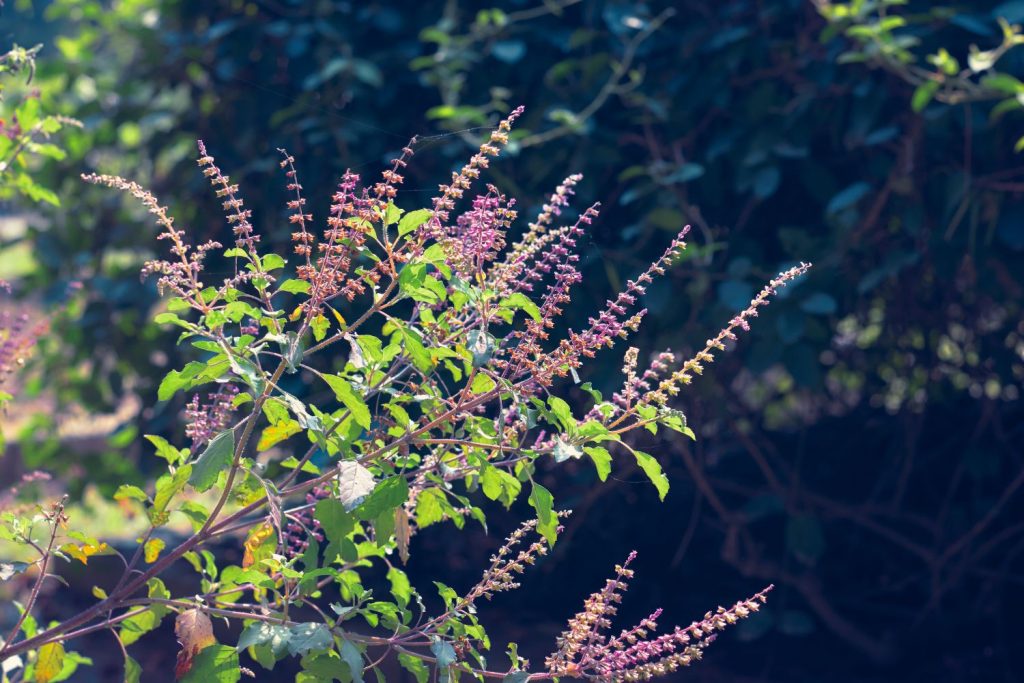
Tulsi tea contains a mix of vitamins, minerals, and plant compounds. These elements give the tea its health benefits and unique flavor.
Vitamins and Minerals
Tulsi leaves are rich in essential nutrients. They contain calcium, which helps build strong bones and teeth. The leaves also provide iron, important for carrying oxygen in the blood.
Vitamin C is another key nutrient in tulsi. This vitamin boosts the immune system and helps the body absorb iron. Tulsi also contains vitamin K, which aids in blood clotting.
Zinc is present in tulsi leaves too. This mineral supports immune function and wound healing. The amounts of these nutrients can vary based on growing conditions and processing methods.
Phytochemicals and Essential Oils
Tulsi leaves contain powerful plant compounds. These include eugenol, a fragrant oil with anti-inflammatory properties. Cineole, another essential oil, may help with respiratory issues.
Ursolic acid is a compound found in tulsi that might have anti-cancer effects. The leaves are also rich in antioxidants. These substances fight harmful free radicals in the body.
The essential oil of tulsi is complex. It contains many aromatic compounds that give the tea its distinct smell and taste. These oils may contribute to the calming effects of tulsi tea.
Preparation and Consumption
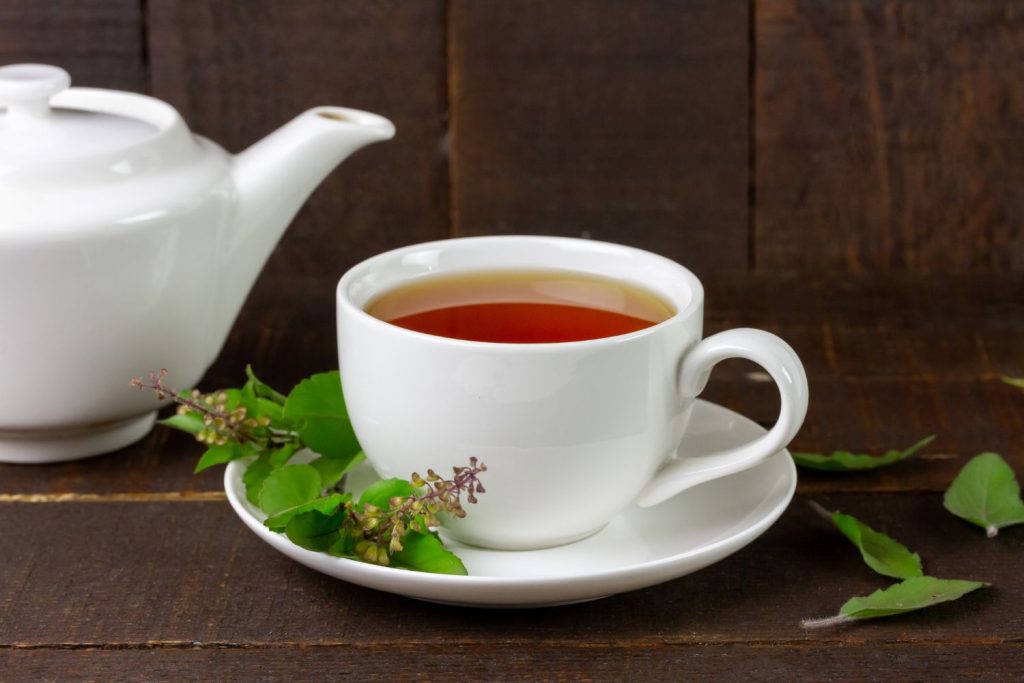
Tulsi tea offers a variety of brewing methods and can be easily integrated into daily routines. Its versatile nature allows for both hot and cold preparations, making it a popular choice for tea enthusiasts.
Brewing Methods
To make tulsi tea, start by boiling water. Use 1-2 teaspoons of dried tulsi leaves or 1 tea bag per cup. Let it steep for 5-10 minutes. The longer it steeps, the stronger the flavor becomes.
For a cold brew, place tulsi leaves in cold water and refrigerate overnight. This method results in a milder taste.
Tulsi tea can be enhanced with other ingredients:
Tulsi is available in various forms:
- Loose leaves (green or purple)
- Tea bags
- Powder
Integrating Tulsi Tea into Your Diet
Tulsi tea can be enjoyed throughout the day. It’s caffeine-free, making it suitable for evening consumption. Start with one cup daily and gradually increase intake.
Mix tulsi powder into smoothies or yogurt for a quick health boost. It can also be used as a seasoning in cooking.
For those who prefer supplements, tulsi capsules are available. However, the tea form allows for better absorption of its beneficial compounds.
Experiment with different tulsi varieties:
- Green tulsi: Mild, slightly sweet
- Purple tulsi: Peppery, more intense
Tulsi tea can be sweetened with honey or lemon for added flavor. It pairs well with light snacks and can replace regular tea or coffee in social settings.
Safety and Side Effects
Tulsi tea is generally safe for most people, but some groups should be cautious. It may interact with certain medications and have side effects for specific individuals.
Contraindications for Specific Groups
Pregnant and nursing women should avoid tulsi tea. It may affect hormones and fertility. People with diabetes need to be careful as tulsi can lower blood sugar levels.
Those with bleeding disorders or scheduled for surgery should stop drinking tulsi tea. It can thin the blood.
Always talk to a healthcare provider before using tulsi tea if you have any medical conditions.
Possible Interactions with Medications
Tulsi tea may interact with some medications. It can increase the effects of blood thinners like warfarin. This raises the risk of bleeding.
People taking diabetes medications should be careful. Tulsi can lower blood sugar, which may lead to hypoglycemia when combined with diabetes drugs.
Tulsi might also interact with thyroid medications. It’s important to speak with a doctor before drinking tulsi tea if taking any prescription drugs.
The dosage of tulsi tea can affect its potential for side effects and interactions. Start with small amounts and increase slowly if no problems occur.
Sustainable Practices and Procurement
Sustainable tulsi cultivation promotes environmental health and supports local communities. It ensures a steady supply of this sacred herb while preserving traditional farming methods.
Sourcing Organic Tulsi
Organic tulsi comes from farms that avoid synthetic pesticides and fertilizers. These farms are often in Southeast Asia, where tulsi is native. They grow Krishna Tulsi, Rama Tulsi, and Vana Tulsi varieties.
Organic farming helps protect soil and water quality. It also supports biodiversity on the farm. Farmers use natural pest control methods and crop rotation to keep plants healthy.
Buying organic tulsi supports small farmers and their communities. It helps preserve traditional knowledge about this sacred herb. Look for certified organic labels when purchasing tulsi products.
Grow Your Own: Tips for Cultivation
Growing tulsi at home is easy and rewarding. It thrives in warm, sunny spots with well-drained soil. Start with seeds or small plants from a nursery.
Water tulsi regularly, but don’t overwater. It prefers slightly dry conditions. Pinch off flower buds to encourage bushy growth and more leaves.
Tulsi grows well in pots on balconies or in gardens. It can be grown indoors near a sunny window. Harvest leaves often to promote new growth.
Use organic compost to feed your tulsi plants. Avoid chemical fertilizers. Growing your own ensures a fresh supply of this sacred herb for tea and other uses.
Frequently Asked Questions
What are the health benefits associated with drinking Tulsi tea?
Tulsi tea can boost the immune system and help fight infections. It may reduce stress and anxiety levels. The tea also supports digestive health by stimulating the release of gastric juices. This can aid in smoother bowel movements.
Can Tulsi tea have a positive impact on skin health?
Tulsi tea contains antioxidants that may benefit skin health. These compounds can help protect skin cells from damage caused by free radicals. Regular consumption might lead to clearer, healthier-looking skin. However, more research is needed to confirm these effects.
How does daily consumption of Tulsi tea affect the body?
Daily Tulsi tea intake may support overall wellbeing. It can help reduce stress and promote relaxation. The tea also provides small amounts of nutrients like calcium, vitamin C, iron, and zinc. These contribute to various bodily functions.
What are the potential side effects of regularly consuming Tulsi tea?
While generally safe, some people may experience side effects from Tulsi tea. These can include nausea, diarrhea, or allergic reactions in rare cases. Pregnant women should consult a doctor before drinking Tulsi tea. It may have effects on hormone levels or uterine contractions.
In what ways does Ayurveda recognize the benefits of Tulsi tea?
Ayurveda considers Tulsi a sacred plant with powerful healing properties. It is believed to balance the body’s doshas or energy types. In Ayurvedic practice, Tulsi tea is used to promote physical and spiritual wellbeing. It is thought to enhance vitality and longevity.
What should one be aware of before adding Tulsi tea to their diet?
People taking medications should consult a healthcare provider before drinking Tulsi tea regularly. It may interact with certain drugs. Those with bleeding disorders should use caution. Tulsi may slow blood clotting and increase the risk of bleeding.
References:
The Clinical Efficacy and Safety of Tulsi in Humans: A Systematic Review of the Literature
A Review Paper on Tulsi Plant (Ocimum sanctum L.)
This website does not provide medical advice.
All information provided on this website, and on associated social media networks, including but not limited to texts, images, and numbers are for general information purpose only. It is not intended as medical advice and it does not include all possible precautions, side effects, or interactions that may occur. Neither NaturalLivingOnline.com nor its author/founder take responsibility for how you use this information. Statements contained on NaturalLivingOnline.com have not been evaluated by the FDA. You should conduct thorough research via multiple sources and consult your physician or qualified doctor before using any essential oil or herbal remedy. Information on NaturalLivingOnline.com must not be relied upon for medical, legal, financial or other decisions.

